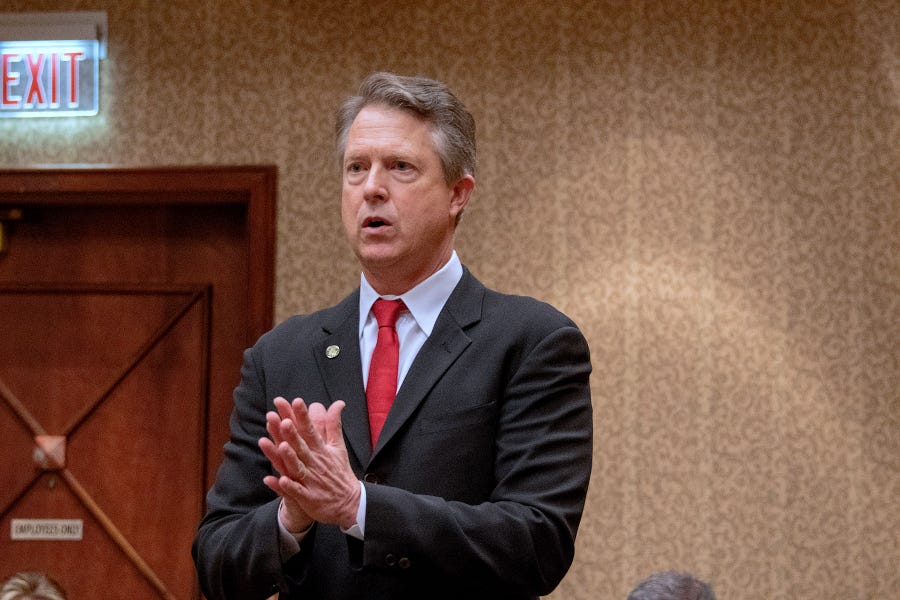An election that’s poised to smash turnout records across the nation is a tricky thing to predict. An astonishing 96 million ballots have already been cast as of Monday morning; by the time the polls close tonight, 2016’s record raw vote total of 136 million is likely to be a distant second.
This is part of the reason why Democrats—despite Joe Biden’s sizable and stable national polling lead and small but stable lead across nearly all swing state polls—still aren’t letting themselves see the result as a foregone conclusion. It’s also why they’re hopeful about their chances of making inroads in states where the GOP has been impregnable for a generation or more.
Some of these states, like Texas and Georgia, have been hotly contested in the last few years. But perhaps the best illustration of the fact that nobody knows what the heck’s going to happen is the fact that we’re currently looking at a close Senate race in Kansas.
Kansas! The state has elected a grand total of three Democrats to the Senate since it became a state in 1861, the most recent of whom was voted out in 1938. Four-term incumbent Pat Roberts never faced a serious general election challenge since he was first elected in 1996; his 11-point victory against entrepreneur and independent candidate Greg Orman in 2014 was his closest ever shave.
But Roberts is retiring, and his open seat might not be the ordinary Republican cakewalk. GOP Rep. Roger Marshall, Roberts’s heir apparent, has run a competent campaign, but state Sen. Barbara Bollier, whose district comprises much of the Kansas City suburbs, is giving him a significant run for his money.
Bollier has four things going for her. The first, and most important, is that President Trump has lost ground in Kansas since 2016. He’ll still cruise to reelection, but most quality polls have him up “only” by about 7 to 12 points. Four years ago, he won the state by 21. If that were still the topline split, none of the following would matter.
The second is that, as red-state Democrats go, Bollier’s got about as strong a claim to describe herself as a “moderate” as any—she was an elected Republican until she switched parties two years ago, saying she no longer wanted to be complicit in the party’s acceptance of President Trump, stance on LGBTQ issues, and opposition to Medicaid expansion in the state.
The third is that both Bollier and Marshall are doctors by trade, which has kept the race even more strongly focused on health care issues than the median campaign this year. This in a state where, despite President Trump’s above-water approval rating, only roughly 40 percent approve of his handling of the coronavirus pandemic.
And the fourth is that, as an aspirational red-state Democrat, Bollier’s campaign has been buoyed by an enormous transfusion of cash, both in-state and out: Last quarter, she brought in a whopping $13.5 million, while Marshall didn’t break $3 million.
Outside spending has narrowed that gap. Unsurprisingly, Mitch McConnell’s Senate Leadership Fund has spared no expense in trying to cap Bollier’s polling rise; the group has poured more than $15 million into the race on ads portraying Bollier as a rubber-stamp for a radical left-wing agenda. One notable spot features Bollier’s face repeatedly morphing into Pelosi’s.
“Chuck Schumer ain’t dumb,” GOP strategist David Kensinger told The Dispatch. “If she were elected to the Senate, she would empower the most left-wing Congress in American history.”
Nevertheless, while Bollier is a definite underdog, the polls suggest she’s got a real shot. The latest New York Times/Sienna poll gave Marshall a 4-point edge—just barely within the margin of error. If you go in for such things, FiveThirtyEight’s model gives Bollier roughly a 1-in-5 chance—not great odds, but better than Trump’s.
It wasn’t supposed to be this close. After Secretary of State Mike Pompeo removed his name from consideration, the whole point of the Marshall campaign was that he was supposed to be the safe GOP play. During primary season, Kansas Republicans’ main worry was that immigration hardliner Kris Kobach, a candidate who two years ago managed to lose a governor’s race to Democrat Laura Kelly, would win the nomination and fumble away a second straight statewide race. (Here, too, Marshall got a spending assist from McConnell’s leadership fund, who barraged Kobach with attack ads; he won the primary by 14 points.)
Despite the closeness of the race, however, Kansas Republicans are still counting their blessings on that front. Kobach has been in the news again in recent days as the general counsel for the We Build the Wall charity—a project whose leaders, including former Trump adviser Steve Bannon, are currently under indictment for fraud after raising money to fund a wall on the U.S.-Mexico border, then allegedly embezzling it themselves. Kobach has not been charged with a crime and is not referenced in any indictments, but he has been waging a (so far unsuccessful) legal fight to get himself paid from the group’s funds before it’s used to make reparations to victims of the alleged scam.
“Can you imagine if he was the Republican nominee for U.S. Senate in Kansas while all that was going on?” Kensinger said. “And that was all stuff, by the way, we didn’t know on primary day. This is all stuff that’s happened in the last 90 days. And before that, we knew Kris Kobach was a disastrous candidate.”
Photograph by Mark Reinstein/Corbis/Getty Images.






Please note that we at The Dispatch hold ourselves, our work, and our commenters to a higher standard than other places on the internet. We welcome comments that foster genuine debate or discussion—including comments critical of us or our work—but responses that include ad hominem attacks on fellow Dispatch members or are intended to stoke fear and anger may be moderated.
With your membership, you only have the ability to comment on The Morning Dispatch articles. Consider upgrading to join the conversation everywhere.